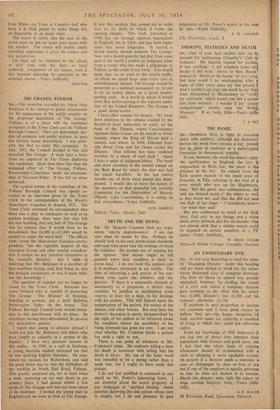THE GRANGE, FULHAM SIR,—The reception accorded my friend John Betjeman
in his attempt to gather information for his appearance at the put* enquiry on the proposed demolition of 'The Grange, Fulham, is of a piece with the consistent arrogance of the Town Clerk and the Fulham Borough Council. They arc determined, des- pite all evidence and public protests, Os have this historic house demolished. I was prob- ably the first to enter this campaign. In July, 1952, the Council decided to buy and demolish The Grange. A week later a letter from me appeared in The Times deploring this vandalism. Since then there has been the sustained effort of The Grange, Fulham, Preservation Committee' under the chairman- ship of Viscount Esher. It has left no stone unturned.
The cynical nature of the vandalism of the
• Fulham Borough Council was openly re- vealed in an interview given by the Town Clerk to the correspondent of the Weekly Manchester Guardian in August, 1952. The Town Clerk informed its correspondent that there was a duty to ratepayers as well as to ancient buildings, there were few sites left for new building, that one half of The Grange was so ruinous that it would have to be demolished, that £6,000 to £11,000 would be needed to repair the worst half. ' The official view,' wrote the Manchester Guardian corres- pondent, has the regretful support of the Georgian Group and after careful considera- tion it cannot see any practical alternative to the council's decision.' Am I right in believing that Mr. &Oman is a member of that excellent Group, and, that being so, was the decision unanimous, or was it made with- out his knowledge ?
The question of expense can no longer be raised by the Town Clerk. Someone has come forward who is capable of preserving The Grange. The Minister of Housing, listening to protests, put a draft Building Preservation Order on the house. The Fulham Borough Council took violent excep- tion to this interference with its plans. Its objections having been demolished, its passion for destruction persists.
I regret that owing to absence abroad I could not join Mr. Betjcman and others who have fought so valiantly in a protest at the Inquiry. I have very personal reasons in this matter, In 1936, in a caf6 in Salzburg, a young Austrian student informed me that he was studying English literature. He men- tioned his passion for Richardson, and said his great desire was to visit the birthplace of the no*list in North End Road, Fulham. This greatly surprised me, for at least twice
It was this incident that caused me to write And So To Bath, in which it forms the opening chapter. This book, published in 1940; has run through eighteen impressions in England, ten in USA, and has been trans- lated into seven languages. It started a strong tourist current towards The Grangc. Now not a month goes by but that from some part of the world I receive an indignant letter from a reader who has made a pilgrimage to Fulham as the result of my book. You would think that, as an asset to the tourist traffic, on which we spend large sums every year in advertisements abroad, The Grange would be preserved as a national monument, or, to put it on its lowest plane, as a good money- earning asset. In a world in which it would seem that dollar-earning is the supreme ambi- tion of the United Kingdom, The Grange is a good dollar-earner.
1 have other reasons for despair. My book drew attention to the column erected by the Brentford local authorities to mark, on the • bunk of the Thames, where Cassivelaunus opposed Julius Caesar on his march to Veru- lamium, where the King of Mercia held a council, and where, in 1016, Edmund Iron- side drove Cnut and his Danes across the Thames. That column has been rendered invisible by a dump of coal slack 1 Again I have a spate of indignant letters. The book also drew attention to the ancient pumps on the Bath Road by which the dust was' laid for coach travellers. 'In the last twelve months one of thoSe three pumps has disap- peared. 1 would like to learn the names of the members of that powerful but invisible Committee for the Destruction of Historic Objects. Like Communism, it is eating its way everywhere.—Yours faithfully,
CECIL. ROBERTS
Palazzo Vairo, Alassio, Italy


































 Previous page
Previous page